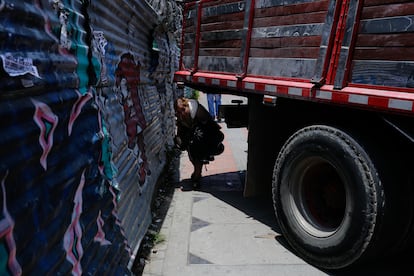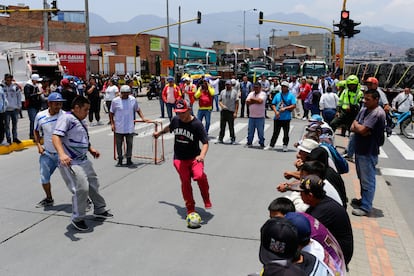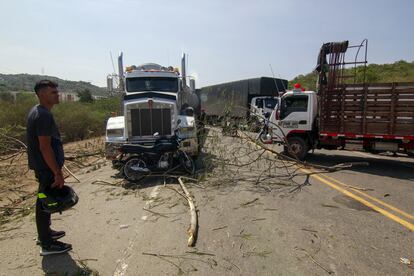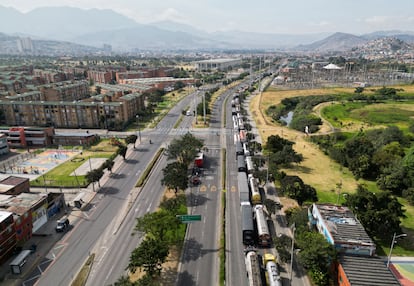In 2018, Gustavo Petro saw his defeat in the second round of the presidential elections as an opportunity. In his memorable speech on election night, when he acknowledged the victory of the conservative Iván Duque, he explained that he would assume the Senate seat reserved for the second most voted candidate as an opportunity to form opposition not from the Capitol, but from the street. He said that he was returning to Congress, where he had occupied a seat between 1998 and 2010, “to lead a people that must be mobilized.” And he added: “We are returning to the Senate not to see how the articles are negotiated, but to tour the public squares.” In the following years, strikes and demonstrations paralyzed the country and hit the Duque government hard, and Petro always supported them. Now, after two years as president, his decision to increase the price of diesel fuel takes him to the opposite shore, to that of the president who faces a social mobilization.
In the first hours of the strike, the government has not ordered the police to dismantle the blockades that have been multiplying in an increasing number of areas of the country. There are no reports of violent clashes, which is already an achievement compared to the images of violence unleashed during the strikes of 2019 and 2021 and a mark of difference between the first left-wing president of contemporary Colombia and his predecessor. However, the social mobilizations of those years had much broader and more diverse motivations, a much more distinct opposition flavor and, in general, are not comparable with the current and growing truckers’ strike, at least up to this point. In addition, truckers’ strikes have not had a history of particular violence, nor of an easy solution. The sector, divided into several unions and thousands of owners of different economic capacities, sizes and regions, has already been the protagonist of strong mobilizations that have put other governments in a state of crisis. In 2016, the strike lasted a month and a half, involving more than 30,000 transporters and resulting in a victory for the transporters.
This time, the strike was born in slow motion. Since Petro came to power in August 2022, the government announced its willingness to maintain the increases in the price of gasoline, which Duque kept frozen for months despite the fact that it produced a multimillion-dollar deficit and which only began to increase once Petro had been elected. In September, Petro and his first ministers of Mines, Transport and Finance defined the path and clarified that the increase would exclude ACPM, the Colombian name for diesel fuel, for the moment due to its economic and social impacts: almost all cargo is moved by diesel-powered trucks, and an increase would lead to higher inflation just when it was soaring. In parallel, the government created a technical table with representatives of the transporters, precisely to solve the problem before it escalated.

The table, which took a long time to form, has met 13 times. In it, the transporters have essentially brought one request and one argument. The request was for the Government to modify the formula that determines the price of diesel fuel, so that it is not tied to the international price of a product that Colombia does not import (in contrast to the 40% of gasoline that is refined in other countries). One argument, related to this demand, is that this fuel is not really subsidized by the State, since in its calculations the price that has remained stable since 2019 already leaves a profit for the majority state-owned Ecopetrol, which produces it, and income for the treasury through the various taxes paid by those who consume it. What happens, they explain, is that the formula leads the State to recognize the oil company for the difference between what it would receive from exporting the fuel and what consumers pay, a cost to the treasury that is offset, they say, by the dividends that Ecopetrol then distributes. “It’s like taking something out of one pocket of one pair of pants and putting it into another pocket of the same pair of pants,” Nidia Hernández, director of the Colombian Federation of Road Cargo Transporters (Colfecar), summarizes by phone.
Newsletter
Analysis of current events and the best stories from Colombia, every week in your inbox
RECEIVE IT
Despite the concerted work, in the middle of this year the Government informed the unions that it was rejecting the possibility of modifying the formula and, shortly after, that it would begin with the increase in prices to the public, something that is its power. In short, it would increase the input that the transporters have said is equivalent to 40% of their costs. In the past months, the panorama had changed noticeably. Not only were there new ministers, but inflation had dropped from a peak of 13.34% in March 2023 to a more manageable 6.86% in July of this year. In addition, since December 2023, the increases in the price of gasoline had ended. On top of everything, the ACPM has left a gap in the nation’s accounts that the Minister of Finance, Ricardo Bonilla, estimates at 12 billion pesos a year, precisely the amount missing in the ambitious budget for 2025 that the Government has presented to Congress. In short, several factors were aligned to take the next step in one of Petro’s few economic policies that have been applauded by practically all economists.

The announcement led to a peaceful demonstration, organized by several of the nine unions grouped in the Inter-Union Chamber of Transport, Unidos, last Friday in Bogotá. That same day, Bonilla announced the exact amount of the increase (1,904 pesos, about 48 cents or 20%), the date on which it would be implemented (last Saturday, August 31) and his calculation of the savings for the Government, of 1.6 billion pesos in what remains of 2024. The next day, the first groups of transporters began to organize in Santander and Caldas, two departments in the center-east and center-west of the country. Since then, truckers who have refueled have paid more for their fuel, and more and more hotbeds of blockades and mobilization have emerged. This Tuesday, they strongly impacted large cities, including Bogotá, which decreed teleworking for employees of the District, or Cúcuta, on the border with Venezuela. For this Tuesday, it is announced that others will join, such as Cali, the epicenter of the 2021 protests.

This growing movement has elicited a response from the Government on two levels. Specifically, the Minister of Transport, María Constanza García, called for dialogue and convened a virtual meeting, and together with her colleague from the Interior, Juan Fernando Cristo, announced that the remaining increases – which in any case had no date and had been mentioned as being in 2025 – were temporarily suspended. To these conciliatory announcements, they added a request: that the blockades be lifted. “We ask all these protesters in the country to lift these blockades, that the Government is committed to continuing the dialogue and that, above all, there cannot be permanent blockades anywhere.” Shortly after, the truckers responded with a sharp refusal.
In addition to these decisions, the Government has sought to align itself symbolically with the rank-and-file truck drivers. “This is an inevitable, painful decision that this Government would not have wanted to take, but which is absolutely necessary in the current fiscal situation,” said Minister Cristo. He did, however, make a distinction, explaining that he understands that “small truck drivers, feeling the economy of their homes in all regions affected, reject the Government’s decision.” This is the echo of a vision that has been defended by the President, who on Wednesday morning argued that they were facing “a lock out: a business strike.” Hernández responds that the strike is more like a thousand-headed jellyfish, spontaneously organized by all kinds of truckers. “In fact, link “740 people entered the strike that the minister sent to negotiate,” he sums up to explain that, although the strike is sectoral, not transversal, it is a decentralized strike, with no visible head with whom to negotiate.

Subscribe here to the EL PAÍS newsletter on Colombia and Here on the WhatsApp channeland receive all the key information on current events in the country.
#Truckers #strike #diesel #price #hike #pits #Petro